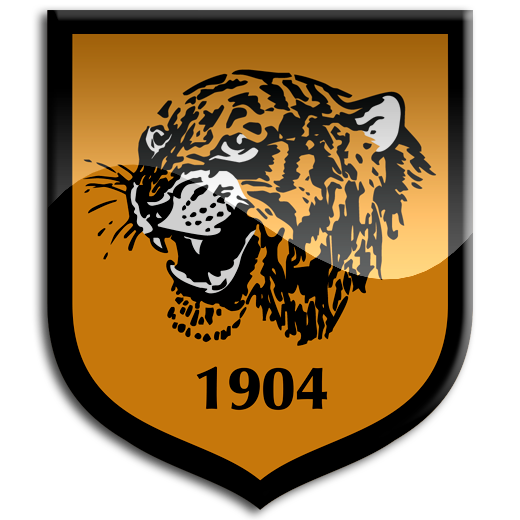KC Stadium
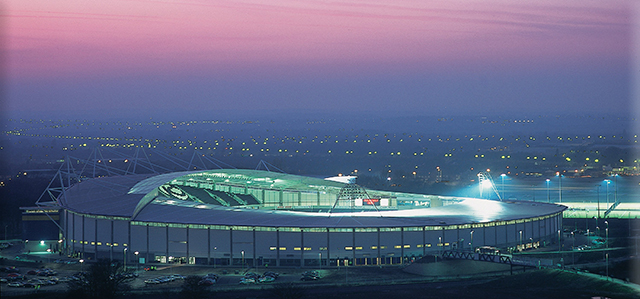
Tennants: Hull City A.F.C. 2003 to present Hull FC (Rugby) 2003 to present Capacity: 25,400 - Opened: 2002
Between 1904 and 1905, Hull City played their home games at The Boulevard. This ground was used by Hull on a contract which allowed them to use it when not used for Rugby League, at a cost of £100 per annum. Hull built their own ground, Anlaby Road, which was opened in 1906.
With the threat of the rerouting of the railway line through the Anlaby Road ground, the club was convinced it needed to secure its future by owning its own ground.
They negotiated the deal for land between Boothferry Road and North Road in 1929, which was financed by a £3,000 loan from the FA. Due to the club's financial difficulties, no work took place for three years, and development then stopped until 1939.
In that year a proposal to build a new multi-purpose sports stadium on the site temporarily halted the club's plans to relocate, but when this plan failed the club resolved to continue with the stalled development of the site, in anticipation of moving to the new stadium in 1940. The outbreak of war, however, meant that the redevelopment again came to a halt, as the site was taken over by the Home Guard.
During the Second World War, Anlaby Road was damaged by enemy bombing, the repair cost of which was in the region of £1,000. The Cricket Club served notice to quit at the same time, and so in 1943 the tenancy was officially ended. Hull were forced to return to the Boulevard Ground from 1944 until 1945 because of the poor condition of the planned stadium at Boothferry Road. The new stadium was finally opened under the revised name of Boothferry Park on 31 August 1946.
Hull City, along with one of the city's rugby league sides, Hull F.C., moved into the newly built KC Stadium in 2002. The KC Stadium was named "Best Ground" at the 2006 Football League Awards.
The KC Stadium, often shortened to the KC, is a multi-purpose facility in the city of Kingston upon Hull (Hull), England. Conceived as early as the late 1990s, it was completed in 2002 at a cost of approximately £44 million. It is named after the stadium's sponsors, telecommunications provider KC, formerly Kingston Communications, a subsidiary of the KCOM Group.
The stadium is owned by Hull City Council and operated by the Stadium Management Company (SMC), who are looking to expand the stadium up to 32,000.
The bowl-shaped stadium contains a continuous single tier of seats with a second tier on the west side. Its current capacity is 25,400. The stadium accommodates fans of its two tenants, association football club Hull City A.F.C., which moved there from Boothferry Park, and rugby league football club Hull F.C., relocated from the Boulevard. The ground also hosts international association football and rugby league football competitions and acts as a venue for concerts by musical artists.
The all-seater stadium consists of a single-tier, asymmetrical bowl that can seat approximately 20,000, with a second tier on the Cranswick plc West Stand that can seat approximately 5,000. Current capacity is 25,586. Plans provide for future expansion to a capacity of approximately 30,000 by the addition of a second tier on the Ideal Standard Community East Stand. Each stand has a name for corporate sponsorship purposes.
On 4 July 2011, Hull City revealed that the stadium's west stand would be sponsored by the local Cranswick plc under a two-year agreement, which was extended on 26 July 2013. On 10 July 2013 it was announced the east stand would be sponsored by Ideal Standard and become known as the Ideal Standard Community East Stand.
Corporate hospitality is provided by 28 executive boxes located between the two tiers of the Cranswick plc West Stand, while security of the stadium is handled using 57 closed-circuit television (CCTV) cameras that cover the stadium. Over the summer of 2007, SMC installed an LED screen in the Smith & Nephew North Stand to replace the old electronic scoreboard.
The screen has an area of approximately 40 m² (430 ft.²) and displays such content as live home game feeds, match highlights, interviews, and action replays.
The stadium's seats are mostly black, with a band of white and amber seats around the circumference. White and amber seats form the word Hull in the north and south stands. In the Ideal Standard Community East Stand, the seats form an image of a coronet, a symbol of the city that also appears in the club crest for Hull and in the coat of arms of the city council.
Black, white, and amber were chosen to remain neutral toward the colours of its two tenants: black and white for Hull and black and amber for Hull City A.F.C. The blue and gold of owner Hull City Council appear in the stadium's four external columns.
The size of the playing surface is 114 x 74 metres (125 x 81 yd) and made of rye grass with a 3% additive of artificial grass. This provides ample room for a FIFA-regulation association football pitch of 105 x 68 metres (115 x 74 yd) and a standard rugby league football pitch of 100 x 68 metres (109 x 74 yd). The playing surface has an automated watering system and below-surface heating.
Set within Hull's West Park, the stadium is the first in England to be built in a parkland setting. The stadium complex also includes the 1,500 seat Bonus Arena, a skate park, two multi-use all weather pitches, a community learning zone complete with classrooms, a health & fitness suite, a cyber cafe, and a library.
The KC Stadium has received several honours. It was named the chief new development in Yorkshire at the Royal Institution of Chartered Surveyors Pro-Yorkshire Awards. It was also on the shortlist for the Prime Minister's Award for Better Public Building and received a high commendation in the British Construction Industry Awards in the Best Value category.
In a 2005 poll that was carried out by Drivers Jonas and decided by football fans from across the country, the KC Stadium was rated highest in comfort, services and view among all grounds in the Football League and was also rated the most-improved venue.
On 13 August 2013 a Goal Decision System by Hawk-Eye was installed in the ground ahead of the 2013–14 Premier League season which requires the use of goal-line technology to indicate if a goal is scored.
Honours
- Football League Championship (level 2 of the English football league system)
- Runners-up: 2012–13
- Play-off winners: 2007–08
- Football League One (level 3 of the English football league system)
- Champions: 1965–66
- Runners-up: 1958–59, 2004–05
- Promoted: 1984–85
- Football League Two (level 4 of the English football league system)
- Runners-up: 1982–83, 2003–04
- Football League Third Division North
- Champions: 1932–33, 1948–49
- FA Cup
- Runners-up: 2014
- Football League Trophy
- Runners-up: 1984
- Watney Cup
- Runners-up: 1974
Name change
In August 2013, owner Assem Allam announced that the club has re-registered as "Hull City Tigers Ltd", and that the team would be marketed as "Hull City Tigers", removing the "Association Football Club" that had been part of the name since the club's formation in 1904. Vice-chairman Ehab Allam said "AFC" would remain on the club badge for the 2013–14 season, but removed thereafter.
In response, a Premier League spokesman said, "We have not been informed of a change in the name of the actual club. They will still be known as Hull City as far as the Premier League is concerned when results or fixtures are published."
According to its Chairman, by 2014, the club would be further renamed "Hull Tigers," because, as he claimed, "in marketing, the shorter the name the more powerful ," while "Association Football Club" made the name too long. Allam stated he dislikes the word "City", as it is too "common" and a "lousy identity", since it is associated also with other clubs, such as Leicester City, Bristol City and Manchester City.
He told David Conn of The Guardian that "in a few years many clubs will follow and change their names to something more interesting and I will have proved I am a leader," adding that if he were the owner of Manchester City, he would change their name to "Manchester Hunter".
Allam justified the intended name change as part of his plans to create "additional sources of revenue" for the club, after Hull City Council refused to sell him the stadium freehold so he could develop, as he had stated, "a sports park" on the site. The council has refused to sell in order, as they stated, "to preserve the annual Hull Fair held on the adjacent car park."
After the collapse of the negotiations, Allam stated: "I had in mind £30 million to spend on the infrastructure of the club, to increase the stadium by 10,000 and to have commercial activities around the stadium — cafeterias, shops, supermarkets — to have all this to create income for the club so that in the future it can be self-financing and not relying on me." He asked rhetorically, "What if I dropped dead tomorrow?"
Supporters' groups expressed opposition to the name change. Bernard Noble, chairman of Hull City's official supporters club said he was disappointed, although he agreed that Allam had saved the club from liquidation and that it was "his club". Blogger Rick Skelton called the name change "a pointless exercise" and said, "Mr Allam's assertion that the name 'Hull City' is irrelevant and too common, is as disgusting a use of the English language as his new name for the club."
Before the first home match of the season on 24 August 2013, a group of supporters marched in protest against the name change, and unfurled a banner that read, "Hull City AFC: a club not a brand". Allam dismissed complaints by the fans, stating "nobody questions my decisions in my business."
In a comment published on 1 December 2013 in The Independent in response to supporters' chants and banners of "City Till We Die", Allam said, "They can die as soon as they want, as long as they leave the club for the majority who just want to watch good football." The supporters responded with chants of "We're Hull City, we'll die when we want" during that day's home match against Liverpool.
Manager Steve Bruce credited the controversy for creating " a fantastic atmosphere" but added, "I have got to have a conversation with him because I don't think he quite understands what it means in terms of history and tradition." However, Bruce also said that, because of the money Allam had invested in the club, "If he thinks Hull Tigers is his way forward then we have to respect it."
On 11 December 2013, a spokesman for Hull City announced that the club had formally applied to the Football Association to have its name changed to "Hull Tigers" from the 2014–15 season onwards. The FA Council, which has "absolute discretion" in deciding whether to approve the plan or not, stated the next day that it would follow a "consultation process" with stakeholders, "including the club's supporter groups."
Some brand and marketing experts have come out in support of the name change.
Nigel Currie, director of sports marketing agency Brand Rapport, stated that "the whole process has been conducted badly with the supporters, but [the name change] is a pretty sound idea." Simon Chadwick, professor of Sport Business Strategy and Marketing at the Coventry University Business School, opined that the objective of opening up lucrative new markets for shirt sales, merchandise and broadcast deals shows commercial vision and could bring benefits, but "this needs to be backed up by a proper marketing strategy and investment."
He said, "it's no use thinking changing the name or the colour of the shirt will pay instant dividends." David Stern, commissioner of the National Basketball Association in the United States, warned: "I would say a wise owner (of a sports club) would view his ownership as something of a public trust, in addition to the profit motive, and you really do want to allow the fans a little bit more input than I think is being allowed, with respect to Hull."
On 17 March 2014, the FA membership committee advised that the name change application be rejected at the FA Council meeting on 9 April. In response, the club published a statement saying the FA was "prejudiced" and criticised the committee's consultation with the City Till We Die opposition group.
The following week, the club opened a ballot of season ticket holders over the name change. Opponents of the name change criticised as "loaded" the questions, which asked respondents to choose between "Yes to Hull Tigers with the Allam family continuing to lead the club", "No to Hull Tigers" and "I am not too concerned and will continue to support the club either way", on the grounds that voters were not given the option to reject the name while keeping the Allam family as owners. Of 15,033 season ticket holders, 5,874 voted in all, with 2,565 voting in favour of the change and 2,517 against, while 792 chose the "not too concerned" option.
On 9 April 2014, the FA Council announced its decision, carried by a 63.5% vote of its members, to reject the club's application for a name change. The club responded by stating it will appeal the decision. However, since there is no appeal process with the FA and its Council decision is final. On 11 September 2014, the clubs owner Assam Allam confirmed an appeal has been submitted to the Court of Arbitration for Sport as well in the news conference he confirmed the club had been put up for sale due to the English FA's decision on 9 April 2014.

History
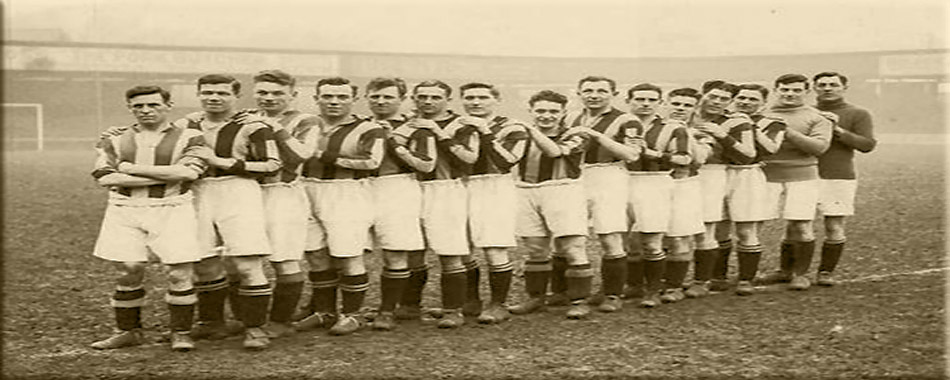
Early history
Hull City Association Football Club was founded in June 1904; previous attempts to found a football club had proved difficult because of the dominance in the city of rugby league teams such as Hull F.C. and Hull Kingston Rovers. The club was unable to apply for membership of the Football League for the 1904–05 season and instead played only in friendlies, the first of which was a 2–2 draw with Notts County on 1 September 1904 with 6,000 in attendance. These early matches were played at the Boulevard, the home of Hull F.C. The club's first competitive football match was in the FA Cup preliminary round, drawing 3–3 with Stockton on 17 September, but they were eliminated after losing the replay 4–1 on 22 September. After disputes with landlords at the Boulevard, Hull City moved to Anlaby Road Cricket Ground. After having played 44 friendly fixtures the previous season, Hull City were finally admitted into the Football League Second Division for the 1905–06 season. Other teams competing in the league that season included the likes of Manchester United and Chelsea, as well as Yorkshire rivals Barnsley, Bradford City and Leeds City. Hull defeated Barnsley 4–1 at home in their first game and finished the season in fifth place.
Hull City and Grimsby Town were the only two professional teams which had official permission to play league football on Christmas Day because of the demands of the fish trade. That tradition has now disappeared following the dramatic reduction of their trawler fleets in recent years. The following season a new ground was built for Hull City across the road from the cricket ground. Still under the managership of Ambrose Langley, Hull continued to finish consistently in the top half of the table. They came close to promotion in the 1909–10 season, recording what would be their highest finish until they matched it in 2008. Hull finished third, level on points with second placed Oldham Athletic, missing promotion on goal average by 0.29 of a goal. Hull regularly finished in the top half of the table before the First World War, but after the war the team finished in the bottom half in seven seasons out of eleven, culminating in relegation to the Third Division North in 1930.
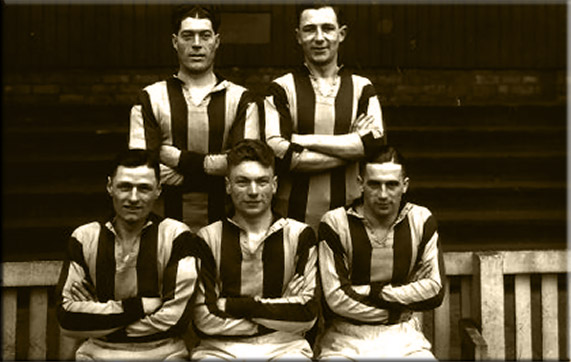 Mid-20th century
Mid-20th century
Hull's greatest achievement in cup competitions until 2014 was in 1930, when they reached the FA Cup semi-finals. The cup run saw Hull knock out the eventual champions of the Second and Third Divisions; Blackpool and Plymouth Argyle respectively. They then knocked out Manchester City, to meet Newcastle United in the quarter-finals. The first game at St James' Park finished as a 1–1 draw, but in the replay Hull beat Newcastle 1–0. The semi-final match against Arsenal took place at Elland Road in Leeds, the game ended 2–2, and was taken to a replay in Birmingham. Arsenal knocked Hull out at Villa Park, the game ending 1–0.
After the Second World War, the club moved to another new ground, Boothferry Park. In the 1948–49 season, managed by former England international Raich Carter, Hull won the Third Division North championship. "Yo-yoing" between the second and third tiers of English football, Hull City had promotion seasons from the Third to the Second Division again in 1959 and 1966, winning the Third Division in the latter season.Hull also became the first team in the world to go out of a cup competition on penalties, beaten by Manchester United in the semi-final of the Watney Cup on 1 August 1970. By the early 1980s, Hull City were in the Fourth Division, and financial collapse led to receivership.
Don Robinson took over as chairman and appointed Colin Appleton as the new manager. Both had previously held the equivalent roles with non-league Scarborough. Promotion to Division Three followed in 1983, with a young team featuring the likes of future England international Brian Marwood, future England manager Steve McClaren, centre-forward Billy Whitehurst, and the prolific goal-scorer Les Mutrie. When Hull City missed out on promotion by one goal the following season, Appleton left to manage Swansea City.
Decline in the late 20th century
Hull reached the Second Division in 1985 under player-manager Brian Horton. They remained there for the next six years before finally going down in 1991, by which time the club's manager was Terry Dolan. Hull finished 14th in the Third Division in the 1991–92 season, meaning that they would be competing in the new Second Division the following season. In their first season in the rebranded division, Hull narrowly avoided another relegation, but the board kept faith in Dolan and over the next two seasons they achieved mid-table finishes. Financial difficulties hampered City's progress, as key players such as Alan Fettis and Dean Windass had to be sold to fend off winding-up orders. In the 1995–96 season Hull were relegated to the Third Division.
In 1997 the club was purchased by former tennis player David Lloyd, who sacked Dolan as manager and replaced him with Mark Hateley after Hull could only finish in 17th place in the table. Hull's league form was steadily deteriorating to the point that relegation to the Football Conference was looking a real possibility. Lloyd sold the club in November 1998 to a South Yorkshire based consortium, but retained ownership of Boothferry Park. Hateley departed in November 1998, with the club at the foot of the table. He was replaced by 34-year-old veteran player Warren Joyce, who steered the club to safety with games to spare. Hull City fans refer to this season as "The Great Escape". Despite this feat, Joyce was replaced in April 2000 by the more experienced Brian Little.
Despite briefly being locked out of Boothferry Park by bailiffs and facing the possibility of liquidation, Hull qualified for the Third Division play-offs in the 2000–01 season, losing in the semi-finals to Leyton Orient.A boardroom takeover by former Leeds United commercial director Adam Pearson had eased the club's precarious financial situation and all fears of closure were banished.
The 21st century
Up the Football League
The new chairman ploughed funds into the club, allowing Little to rebuild the team. Hull occupied the Third Division promotion and play-off places for much of the 2001–02 season, but Little departed two months before the end of the season and Hull slipped to 11th place under his successor Jan Mølby.
Hull began the 2002–03 season with a number of defeats, which saw relegation look more likely than promotion, and Mølby was sacked in October as Hull languished fifth from bottom in the league. Peter Taylor was named as Hull's new manager and in December 2002, just two months after his appointment, Hull relocated to the new 25,400-seater KC Stadium after 56 years at Boothferry Park. At the end of the season Hull finished 13th.
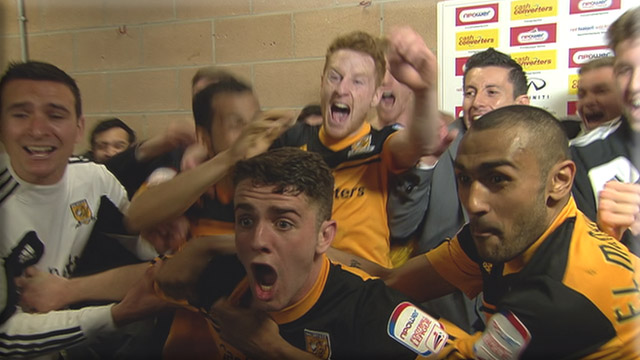 Hull were Third Division runners-up in 2003–04 and League One runners-up in 2004–05; these back-to-back promotions took them into the Championship, the second tier of English football. The 2005–06 season, the club's first back in the second tier, saw Hull finish in 18th place, 10 points clear of relegation and their highest league finish for 16 years.
Hull were Third Division runners-up in 2003–04 and League One runners-up in 2004–05; these back-to-back promotions took them into the Championship, the second tier of English football. The 2005–06 season, the club's first back in the second tier, saw Hull finish in 18th place, 10 points clear of relegation and their highest league finish for 16 years.
However, Taylor left the club to take up the manager's job at Crystal Palace and Colchester United's Phil Parkinson was confirmed as his replacement, but was sacked on 4 December 2006 with Hull in the relegation zone, despite having spent over £2 million on players during the summer. Phil Brown took over as caretaker manager, and took over permanently in January 2007, having taken Hull out of the relegation zone. Brown brought veteran striker Dean Windass back to his hometown club on loan from Bradford City, and his eight goals helped secure Hull's Championship status as they finished in 21st place.
Adam Pearson sold the club to a consortium led by Paul Duffen in June 2007, stating that he "had taken the club as far as I could", and would have to relinquish control in order to attract "really significant finance into the club". Under Paul Duffen and manager Phil Brown, Hull City improved greatly on their relegation battle of 2006–07 and qualified for the play-offs after finishing the season in third place. They beat Watford 6–1 on aggregate in the semi-finals and played Bristol City in the Final on 24 May 2008, which Hull won 1–0 at Wembley Stadium, with Hull native Dean Windass scoring the winning goal. Their ascent from the bottom division of the Football League to the top division of English football in just five seasons is the third-fastest ever.
Top flight spells (2008–present)
Despite being one of the favourites for relegation in the 2008–09 season, Hull began life in the Premier League by beating Fulham 2–1 on the opening day in their first ever top flight fixture. With only one defeat in their opening nine games, including away wins at Arsenal and Tottenham Hotspur, Hull City found themselves (temporarily) joint-top of the Premier League table on points (third on goal difference), following a 3–0 victory over West Bromwich Albion — ten years previously, they had been bottom of the fourth tier of English football. Hull's form never replicated the highs of the early autumn, with the team winning only two more games over the remainder of the season, but secured their top-flight status on the last day of the season due to other results.
On 29 October 2009, chairman Paul Duffen resigned his position with the club, and was replaced by former chairman Adam Pearson on 2 November 2009. On 15 March 2010, manager Phil Brown was put on gardening leave after a run of four defeats left Hull in the relegation zone. Brown's replacement was former Crystal Palace and Charlton boss Iain Dowie, and the appointment was met with some disbelief by supporters who were hoping for a "bigger name" replacement. Hull City's relegation from the Premier League was confirmed on 3 May 2010, after a 2–2 draw at Wigan Athletic. Both Brown and Dowie had their contracts terminated, and Leicester City's Nigel Pearson was confirmed as the new manager.
A reported block on player transfers into the club, set in place by the Hull City board on 28 July 2010 until transfers out would substantially reduce the £39 million-per-year wage bill, at first cast doubt on the new manager's efforts to build a squad capable of a quick return to the Premier League;[36] nevertheless, Pearson brought several transfers and loan signings into the club in his bid to strengthen the squad for the season's campaign. The team set a new club record on 12 March 2011 with 14 away matches unbeaten, breaking a previous record held for over 50 years. This 17-match streak was finally broken by Bristol City on the last day of the 2010–11 season, Hull losing the match 3–0.
On 15 November 2011, Nigel Pearson left the club to return to Leicester. Nick Barmby was appointed as his successor, but was sacked in May 2012 after publicly criticising the club's owners in an interview given to a local newspaper. In the same month, the club's consultancy agreement with Adam Pearson was terminated.
On 8 June 2012, Steve Bruce was appointed manager of the club on a three-year deal,[45] and he guided Hull back to the Premier League by drawing with League champions Cardiff City on the final day of the season.
On 13 April 2014, the club reached its first FA Cup Final after defeating Sheffield United 5–3 in the semi-final at Wembley Stadium. Their place in the 2014-15 Europa League, regardless of whether they won the 2013-14 FA Cup, was confirmed on 3 May as Everton's failure to win meant that Hull's FA Cup Final opponents Arsenal would compete in the 2014-15 UEFA Champions League. Hull City will enter in the third qualifying round, in their first ever European campaign. The FA Cup final on 17 May saw Hull go 2–0 up within the first 10 minutes, before losing 3–2 after extra time.
On 31 July 2014, Hull made their debut in European competition, in the UEFA Europa League third qualifying round, with a 0–0 draw against Slovakian side FK AS Trenčín before winning the second leg 2–1 a week later. An error from keeper Allan McGregor gave them a 1–0 loss away to Belgian outfit Lokeren in the first leg of their play-off tie on 21 August 2014 with the second leg in East Riding of Yorkshire ending in a 2–1 victory, but away goals marked the end of Hull's first foray into European football.
Hull were relegated to the Championship on Sunday May 31st 2015, the final day of the 2014 - 15 Premier League season.
On Saturday 28th May 2016, Hull won promotion back to the Premier League after beating Sheffield Wednesday 1-0 at Wembley in the Play Off Final.
On July 22nd 2016, Steve Bruce resigned as Hull City manager after becoming increasingly frustrated by a lack of transfer activity at the newly promoted Premier League club. The club confirmed that Mike Phelan would act as caretaker manager until a replacement was found.
On 13 October 2016, Phelan was appointed first-team manager on a permanent basis.
On 3rd January 2017 it was announced that Hull City had parted company with manager Mike Phelan
Hull’s statement added: “We would like to thank Mike for his efforts both as assistant manager and head coach over the last two years. The search for a replacement has begun and an announcement will be made in due course.”
On Thursday 5th January 2017, Hull City announced that ex Olympiakos and Sporting Lisbon boss Marco Silva was to take over as new manager, untill the end of the season.
In March 2017, Silva stated that he wanted to end the groundshare agreement with rugby league club Hull F.C. at the KCOM Stadium, as the latter played on Friday and affected the pitch quality for his team at the weekend.
On 25 May, after the team's relegation, Silva resigned.
On 9 June 2017, the club announced the appointment of Leonid Slutsky as head coach. On 3rd December 2017, Leonid Slutsky and Oleg Yarovinsky left the club by mutual consent after a run of bad results.
On 7 December 2017, Nigel Adkins was appointed as head coach on an 18-month contract and Andy Crosby was appointed as his assistant. Adkins resigned at the end of the 2018-19 season after rejecting a new contact.
On 21 June 2019, Grant McCann was appointed as head coach on a one-year rolling contract.
Grant McCann

The Facts
Hull City Association Football Club is an English association football club based in Kingston upon Hull, East Riding of Yorkshire and founded in 1904.
The club participates in the Championship – the 2nd tier of English football – and their greatest achievement in cup competitions came in 2014, when the team reached the final of the FA Cup.
In 2007–08 they achieved promotion to the top flight of English football for the first time in their history by winning the Championship play-off final at Wembley Stadium.
Their highest league finish was for the 2013–14 season, in which they finished 16th in the Premier League table.
Hull City play their home games at the KC Stadium. They previously played at Boothferry Park but moved to their current home in 2002. Boothferry Park has now been demolished and has been replaced by a housing development.
They traditionally play in black and amber, often with a striped shirt design, hence their nickname The Tigers & the club's mascot is Roary the Tiger.
For further information check out their Official website
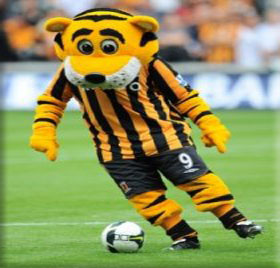
Notable Players
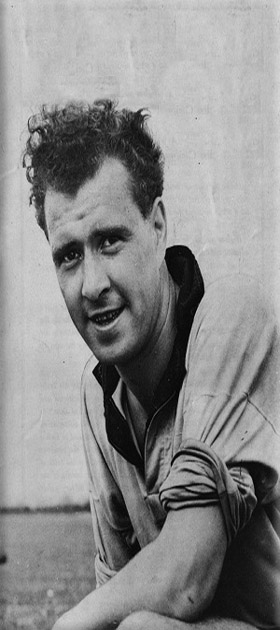
Andy Davidson - 1952 to 1968
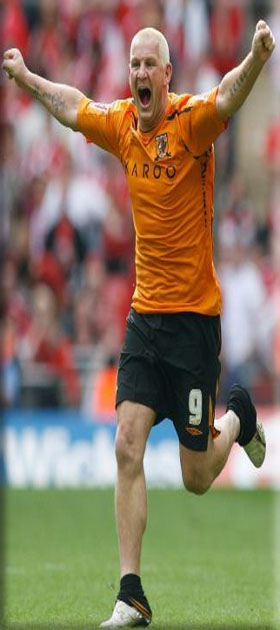
Dean Windass - 1991 to 95 & 07 to 09
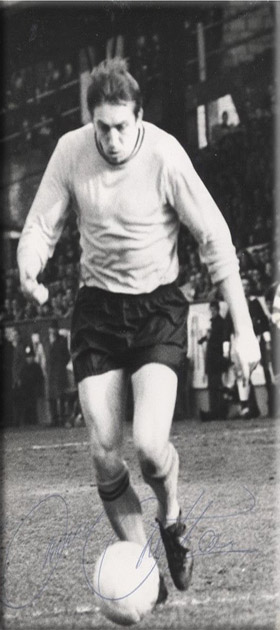
Chris Chilton - 1960 to 1971
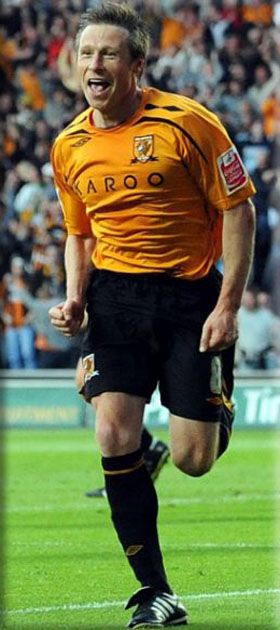
Nick Barmby - 2004 to 2012
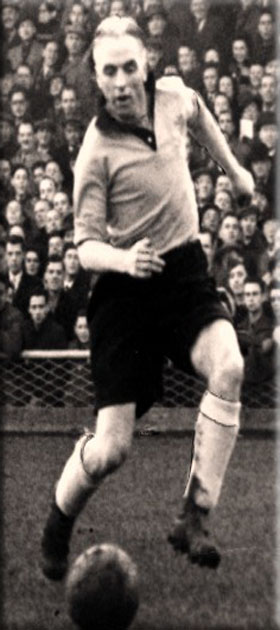
Raich Carter - 1948 to 1952
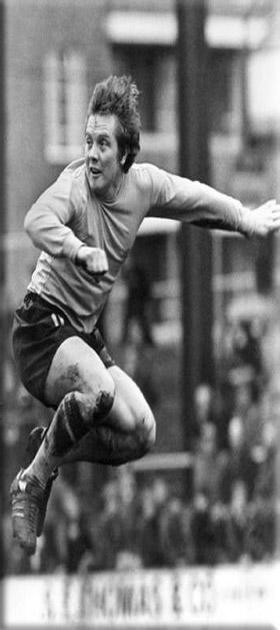
Ken Wagstaff - 1964 to 1976
 01 - Jordan Pickford
01 - Jordan Pickford 02 - Nathan Patterson
02 - Nathan Patterson 04 - Mason Holgate
04 - Mason Holgate 10 - Iliman Ndiaye
10 - Iliman Ndiaye 12 - João Virgínia
12 - João Virgínia 15 - Jake O'Brien
15 - Jake O'Brien 16 - Abdoulaye Doucouré
16 - Abdoulaye Doucouré 19 - Vitalii Mykolenko
19 - Vitalii Mykolenko 29 - Jesper Lindstrøm
29 - Jesper Lindstrøm 31 - Asmir Begovic
31 - Asmir Begovic TBC - Armando Broja
TBC - Armando Broja TBC - Orel Mangala
TBC - Orel Mangala 63 - Žan-Luk Leban
63 - Žan-Luk Leban 65 - Matthew Apter
65 - Matthew Apter 84 - Coby Ebere
84 - Coby Ebere TBC - Kingsford Boakye
TBC - Kingsford Boakye Arsenal
Arsenal Aston Villa
Aston Villa Bournemouth
Bournemouth Brentford
Brentford Brighton
Brighton Chelsea
Chelsea Crystal Palace
Crystal Palace Everton
Everton Fulham
Fulham Ipswich Town
Ipswich Town Leicester City
Leicester City Liverpool
Liverpool Manchester City
Manchester City Manchester United
Manchester United Newcastle
Newcastle Nottingham Forest
Nottingham Forest Southampton
Southampton Tottenham Hotspur
Tottenham Hotspur West Ham United
West Ham United Wolves
Wolves



















